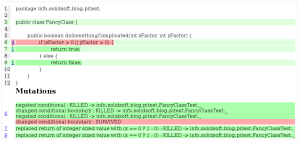Mutation testing allows to check the quality (effectiveness) of automatic tests. PIT (aka pitest) is a leading mutation testing tool for Java environment. In my last blog post about PIT in January 2013 I have covered version 0.29. Since then the PIT development team has been busy and the 4 releases introduced various new features (besides fixed bugs). In this post I will cover the most important (in my opinion) changes in the project (up to recently released version 0.33).
New features
– preliminary support for Java 8 bytecode – PIT can be used with code which contains Java 8 syntax and constructions (including lamdas)
– internal refactoring resulted in much faster “standard” line coverage calculation
– support for parametrized JUnit tests written with Spock (in Groovy) and JUnitParams
– ability to define a coverage threshold (both line and mutation) below which the build will fail
– ability to use PIT with Robolectric
– new Remove Conditionals Mutator (a conditional statement will always be true – not enabled by default as of 0.33)
– new Remove Increments Mutator (an increment operation will be removed – not enabled by default as of 0.33)
– ability to choose JVM to be used for mutation testing
– ability to run PIT only for locally changed files for Maven build with configured SCM plugin
– demanding users can define their own strategies for: test selection, output format and test prioritization – PIT provides extension points which allow to write custom implementations
– partial support for JUnit categories
– support for mutating static initializers in TestNG
In the meantime there were also releases of plugins/tools based on PIT. My plugin for Gradle was enhanced with the dynamic task dependencies resolution (just “gradle pitest” takes care about all the requisites in the Gradle build lifecycle) and support for the additional main and test source sets. Plugin for Eclipse has got (inter alia) a new mutation view and an ability to run PIT against all the projects in a workspace.
Not only releases
Besides new releases PIT has got brand new Bootstrap based webpage, the logo (see above) and the source code was migrated from Mercurial on Google Code to GitHub. The nice thing is that the move resulted in a few contributions withing the first weeks.
Henry Coles the author of PIT also started the new commercial project FaultSeed – “better mutation testing tools for the JVM” which will be based on PIT and has a goal to be 50% faster than PIT and support also Groovy and Scala. Very promising.
PIT (and mutation testing in general) becomes more and more popular and recently there were given a number of talks about it (including my talk at Developer Conference 2014 – slides). The number of questions on the project’s mailing list also significantly increased. And you, have you tried PIT in your project yet?



